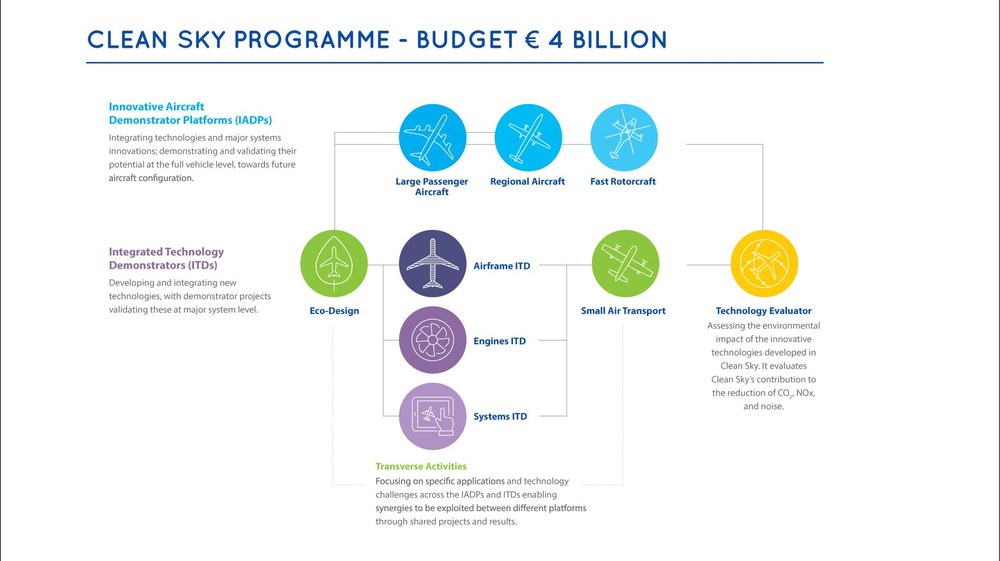On target for sustainable air transport

Clean Sky
Following the agenda of the Clean Sky programme (2008-2017), in 2014 the Clean Sky 2 programme ambitiously continued the successful research collaboration between partners from European industry and research. The participants have defined a set of goals to make a considerable contribution towards more sustainable air transport operations based on multidisciplinary research, intense aerospace industry collaboration and a long-term perspective. Researching and testing technological innovations and aircraft improvements play a central role by enabling the implementation of the European Strategic Research and Innovation Agenda (SRIA) for aviation and the corresponding 'Flightpath 2050' goals. Both have been defined by the Advisory Council for Aviation Research and innovation in Europe (ACARE) and have put a leading roadmap for future aviation development in place. Compared to the year 2000, by 2025 CO2 emission of air traffic shall be reduced by 75 percent per passenger kilometre while noise emissions in the airport surroundings shall be reduced by 65 percent. In addition, 90 percent of travellers within Europe shall be able to complete their journey, door-to-door within four hours.
The Clean Sky 2 programme develops and tests new technologies and aircraft concepts that will significantly contribute to these objectives. In addition to its involvement in various technology and system demonstrator platforms, the German Aerospace Center (Deutsches Zentrum für Luft- und Raumfahrt; DLR) plays a key role in the programme through leading the Technology Evaluator. The Technology Evaluator assesses the Clean Sky 2 benefits with regard to several assessment categories focusing in particular on the environment, as well as on socio-economic improvements.
Innovation potential to increase sustainability
Within the environmental assessment category, the reduction potential for CO2 emissions, NOx emissions and noise, as well as effects of air traffic on local air quality and climate impact have the highest priority. Concentrating on the socio-economic category, the Technology Evaluator also focuses on air transport-related GDP and employment impacts, as well as on mobility and connectivity improvements as an indirect result of the Clean Sky 2 activities. These assessment dimensions are also important in light of the ACARE 'Flightpath 2050' goals, and are analysed by DLR's own forecasts up to the year 2035. Further development up to the year 2050 is estimated on the basis of a scenario approach to enable the calculation of Clean Sky 2 benefits with the most realistic assumptions over the long-term. Changing framework conditions (e.g. in form of capacity constraints and changes of the energy supply chain of the air transport sector) are also reflected.
With regard to the environment, the numerous assessments performed by the Clean Sky 2 Technology Evaluator start at the Mission Level. The impact of the individual aircraft and their contribution to the Clean Sky 2 environmental objectives is in focus here. To consider the environmental impacts on a wider scale, additional assessments are performed at Airport Level (e.g. in relation to rotorcraft mission productivity). The Air Transport System Level is the third and final analysis category to measure the overall impact of the Clean Sky 2 programme over the long-term. This approach guarantees the consideration of all relevant categories of civil air transport, including, for example, long-range operations, regional air transport and fast rotorcraft from a multidimensional and holistic perspective.
Transparency
Going beyond the scope of these essential assessments, an essential role of the Clean Sky 2 programme is its contribution to improving the competitiveness of the European aerospace industry. With a funding volume of 4 billion euro and more than 500 partners (as of 2018) Clean Sky 2 is the largest European research programme and a key driver of innovation and cooperation. DLR’s Technology Evaluator has also transferred this key role to other parts of its research agenda. An in-house Technology Evaluator information system is currently in preparation to provide open access to the described assessment results and to illustrate the added value for society.
